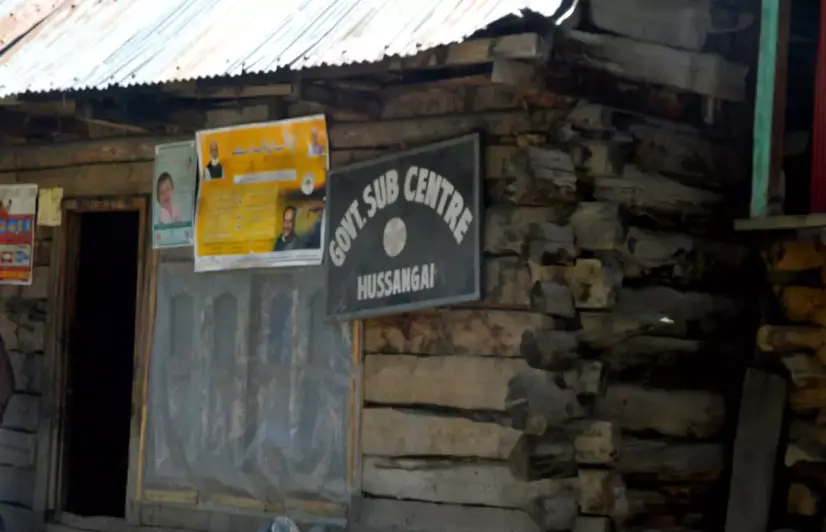A long road to healthcare for Gurez Valley residents

A long road to healthcare for Gurez Valley residents
Bandipore, Jammu and Kashmir: "We don't even have a gynaecologist or dentist here. For the slightest toothache, we need to travel almost 90 km," says Irshad Samoon of Dawar village in Gurez Valley, laying bare the poor healthcare facilities in the border area with a population of 37,000 spread across 29 villages.
Located 86 km
from district headquarters Bandipore in Jammu and Kashmir, most parts of the Gurez
remain cut off for at least six months due to heavy snowfall in winter. With
it, the hardship of Samoon and the like multiply, mainly as the transport system comes
to a standstill.
Gurez has two primary health centres (PHCs) and a community health centre(CHC), where positions of 11 medical officers, three dentists and three specialists (physician, gynaecologist and paediatrician) are lying vacant. According to Block Medical Officer (BMO) Dr Tahira Nazir, the valley also has 23 sub health centres.
Winter woes
Though
Gurez has 11 ambulances, heavy snowfall in winter hampers their operations. “It
is not always practical to airlift patients. So they are referred to other
hospitals in cities, even for minor issues," Fayaz
Ahmad Lone of Bagtore village told 101Reporters.
"We ask patients to remain stationed near CHC Dawar as it becomes tough for them to travel long distances by foot in heavy snowfall. Else, we shift them to the district hospital in Bandipore," says Dr Tahira, stationed at Dawar CHC.
However, this is hardly a solace for those like Mohd Iqbal Lone from Kilshay village, who recounts how he carried his sick father on his shoulders through the snow-clad paths. “Last December, I walked 15 km to Dawar carrying my father, only to be referred to the Bandipore District Hospital," Lone says.
The
district hospital is located in Nusoo, almost 90 km from Dawar. Lone somehow managed
to get his father there for treatment. Much like him, several locals of Gurez have
faced difficulties in accessing medical care.
For pregnant women awaiting deliveries in winter, things are even worse. Zona Begum of Purana Tulail village recalls how her daughter was referred to the district hospital from the CHC. “No ASHA worker can reach us during the wintry period lasting six to seven months. My daughter was not even provided with an iron tablet by these ASHA workers,” Begum tells 101Reporters.
“Her baby
was underweight at the time of birth. That last minute rush to the
district hospital only served to increase her blood pressure,” she adds.
However, Dr Tahira counters this with numbers. “We have 27 ASHA workers in Gurez Valley, and we have constituted six new posts in sub-centres and PHCs," she says.
ASHA worker Naheema of Tulail valley of Gurez responds to the complaints. "We are also helpless in winters as it is impossible to step out of the house."
Improper maternal care leads to anaemia, blood pressure issues and infections, besides affecting the newborn's health. In the absence of gynaecologists, midwives present in villages provide primary, prenatal and obstetric care, but complications in pregnancies pose a big challenge.
Refugees at higher risk
Gurez Valley has seen cross-border migration on three occasions —in 1947, and after the 1965 and 1971 Indo-Pak wars. Migrants from West Pakistan were given 'refugee' status and settled properly. But those who migrated from Pakistan-occupied Kashmir, mainly from Muzaffarabad and Mirpur, are yet to receive such favours.
Gurez has three community development blocks — Bagtore, Kanzalwan Gurez and Tulail. The residents of Refugee-1 Tulail Valley allege that basic facilities elude them because the authorities still see them as refugees.
It's a tiresome walk for many in Gurez Valley because of poorly connected transit (Photo: Tauseef Ahmed)
Ameer Lone (92) was 17 when he came to Gurez. “In Jammu, refugees were given land for establishing their colony, and money to build houses. However, we have not seen any such development in our village. We suffer a lot in winters,” laments Lone, who is from Bhudab village.
Claiming that they have received a “harsh” directive from the district administration telling them to remain stationed near the main district hospital of Bandipore or shift there during winters, many residents say “they cannot afford to do so.”
Meanwhile, a medical officer based in Gurez says on the condition of anonymity that there is a 'no-transfer policy' in practice. “No doctor has been referred to come here. I was posted here in winter. We cannot even step out of our rooms due to heavy snowfall. Even the BMO is stationed here for the last 12 years. The higher authorities should set rolling the transfer policies for doctors in Gurez so that the health system can run smoothly,” he says.
However, Dr Mushtaq, Chief Medical Officer, Bandipore, tells 101Reporters that the government is taking the initiative to fill vacancies in the border villages of Gurez, and action can be expected soon.
Would you like to Support us
101 Stories Around The Web
Explore All NewsAbout the Reporter
Write For 101Reporters
Would you like to Support us
Follow Us On



